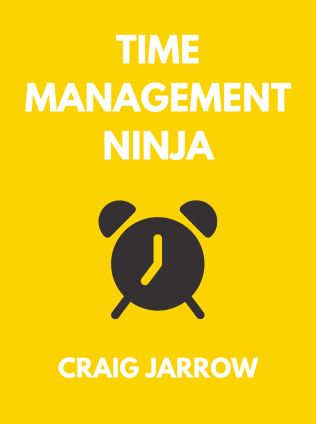
Time Management Ninja
21 Rules for More Time and Less Stress in Your Life
By Craig Jarrow
Published 09/2019
About the Author
Craig Jarrow, the author of Time Management Ninja, is a recognized authority on productivity and time management. He founded the widely followed blog "Time Management Ninja," which provides practical advice on managing time, boosting productivity, and achieving personal and professional goals. Jarrow's approach is characterized by its simplicity and practicality, making time management accessible to a broad audience. He has helped thousands of people reclaim their time and reduce stress through his straightforward tips and techniques. Jarrow's work emphasizes that anyone can become a 'time management ninja' with the right strategies and mindset.
Main Idea
Time Management Ninja: 21 Tips for More Time and Less Stress in Your Life by Craig Jarrow offers actionable strategies to help readers manage their time more effectively. The book introduces 21 essential principles that cover a wide range of time management techniques, from prioritizing tasks and avoiding procrastination to decluttering one's life and focusing on what truly matters. Jarrow stresses that effective time management should simplify life rather than add complexity. The ultimate goal is to free up time for important activities and reduce stress, enabling readers to live a more balanced and fulfilling life.
Table of Contents
- Introduction: Time Management Should Make Time, Not Take Time
- Chapter 1: The Four Productivity Weapons
- Chapter 2: Your To-Do List Should Be Your Best Friend
- Chapter 3: Make Appointments With Yourself And Your Work
- Chapter 4: Write It Down Now, So You Don’t Have to Remember It Later
- Chapter 5: Planning Is Good, Preparing Is Better
- Chapter 6: Be the Early Bird and Get a Head Start on the World
- Chapter 7: Do Tasks Until Done
- Chapter 8: Put It Away Now, and You’ll Know Where It Is Later
- Chapter 9: The ABC Method of Cleaning
- Chapter 10: One Extra Task a Day Keeps Procrastination Away
- Chapter 11: Never Confuse Busy with Productive
- Chapter 12: You Can’t Finish If You Don’t Start
- Chapter 13: Realize You Are Stronger Than You Think
- Chapter 14: Know You Are What You Do Every Day
- Chapter 15: Use Your Tech for Good, Not Evil
- Chapter 16: Make Choices or Life Will Make Them For You
- Chapter 17: Passion Makes You More Productive
- Chapter 18: Let It Be (You Can’t Do It All)
- Chapter 19: Don’t Create Your Own Life Friction
- Chapter 20: Live Your Life Or You Won’t Have One
Introduction: Time Management Should Make Time, Not Take Time
Jarrow begins by emphasizing that effective time management should simplify rather than complicate one's life. He criticizes overly complex systems that require significant time to manage, suggesting that they defeat the purpose of time management. Jarrow advocates for a straightforward approach, focusing on practical tools and common-sense strategies. He argues that time management should create more time for important activities, reduce stress, and enhance overall quality of life.
"If your time management requires a flow chart, it is too complicated." - Craig Jarrow
Chapter 1: The Four Productivity Weapons
Jarrow introduces four essential tools for effective time management: a to-do list, a calendar, an address book, and a notebook. These tools are described as 'weapons' in the battle against disorganization and time wastage. Jarrow emphasizes that these tools should always be readily accessible, allowing individuals to manage their tasks, schedule, contacts, and ideas efficiently.
The to-do list is a fundamental tool for tracking tasks and obligations. Jarrow suggests keeping a single, comprehensive list that includes all tasks, whether big or small. This helps free up mental space and ensures that no task is forgotten. The calendar is crucial for scheduling appointments and deadlines, helping individuals manage their time and commitments effectively. The address book stores contact information, facilitating communication and networking. Finally, a notebook is used to capture notes, ideas, and important information, ensuring that valuable insights are not lost.
- To-Do List: A central repository for all tasks and obligations, helping to clear mental space and prioritize effectively.
- Calendar: A tool to manage appointments, deadlines, and time commitments, ensuring that nothing is overlooked.
- Address Book: A resource for storing and managing contact information, vital for networking and communication.
- Notebook: A place to jot down notes, ideas, and important information, preventing valuable insights from being forgotten.
Chapter 2: Your To-Do List Should Be Your Best Friend
Jarrow delves deeper into the importance of the to-do list, describing it as a 'best friend' in time management. He advises maintaining one universal list that captures all tasks as they arise. This list should be prioritized, with the most critical tasks placed at the top. Jarrow emphasizes that the list should always be with you, allowing you to add tasks whenever they come to mind and preventing the risk of forgetting important responsibilities.
Sign up for FREE and get access to 1,400+ books summaries.
You May Also Like
The Subtle Art of Not Giving a F*ck
A Counterintuitive Approach to Living a Good Life
By Mark MansonRich Dad Poor Dad
What the Rich Teach Their Kids About Money - That the Poor and Middle Class Do Not!
By Robert T. KiyosakiHow To Win Friends and Influence People
The All-Time Classic Manual Of People Skills
By Dale CarnegieQuiet: The Power of Introverts
The Power of Introverts in a World That Can't Stop Talking
By Susan Cain



















